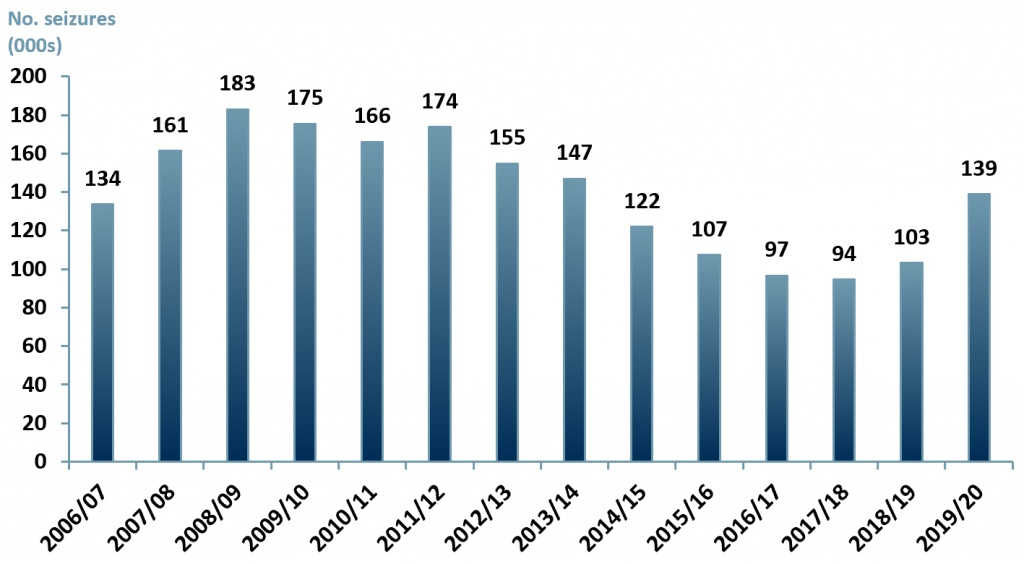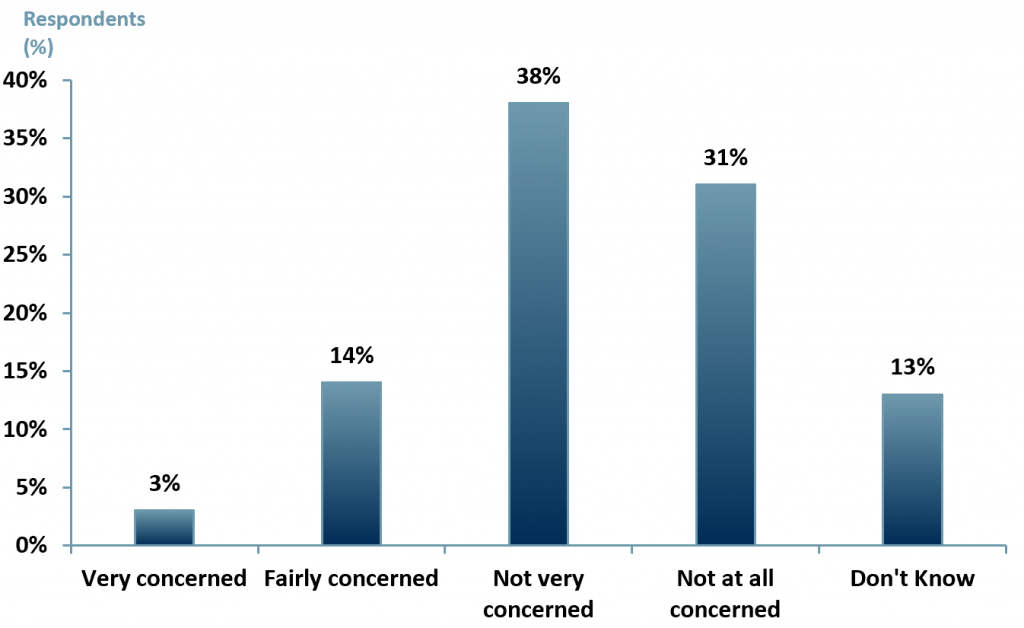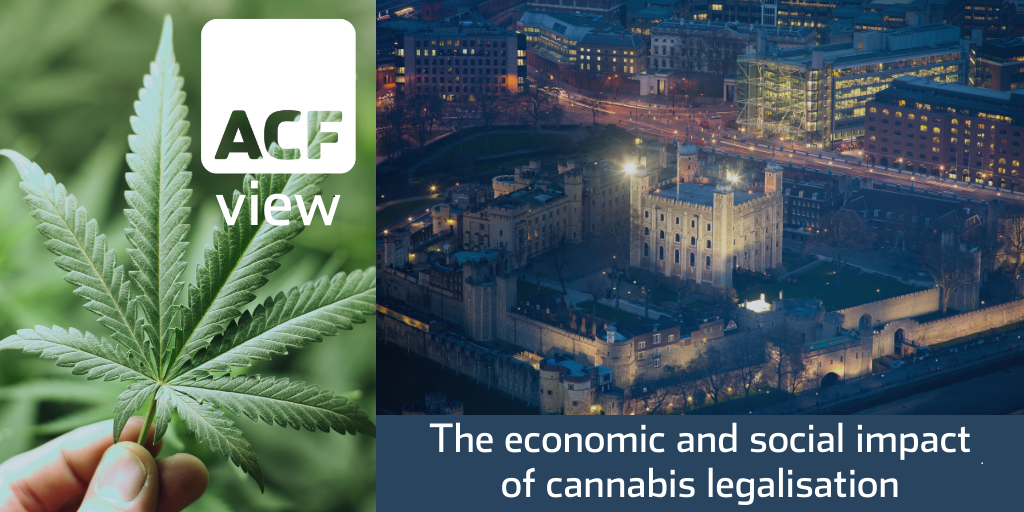The economic and social impact of cannabis legalisation
Cannabis related offences continue to marginalise minorities. Legalising cannabis could have a positive impact on inequality and that is good for the general economy in numerous ways.
Can the UK really afford to ignore a multi-billion dollar global market set for strong growth given current economic circumstances and the trading course it has set for itself outside Europe? Below we attempt to articulate, the social, political, legal and economic rational for legalisation and the inevitability of this outcome.
Key points:
- According to The Times newspaper using Ministry of Justice data – cannabis offences have cost the UK prison system £2.5bn over the four year period YE15-19.
- For YE18 some estimates suggest the UK prison population was 93k vs. maximum capacity of 96k. It is popularly quoted that it costs around £65k p.a. to hold a prisoner in the UK. Our prisons are overcrowded and expensive.
- Of those in prison for cannabis offences, British Blacks make up 25% of this sub-set of the prison population, even though they only make up 4% of the British population.
- A recent study produced by the Common Wealth / @KojoKoram (Cannabis and Capitalism: The Questions of Ownership in Drug Policy Reform) calls on the UK to include the BAME community if cannabis were to become fully legalised.
- The Common Wealth study also covers the inequalities faced in the US where only 19% of Cannabis business owners are BAME – the US$ 8bn industry is disproportionately dominated by white (male) managers and owners. These statistics suggest some uncomfortable inferences.
ACF View:
UK prisons are overcrowded in part because 67% of the prison population (56,000) are held for non-violent offences. 46% were sentenced to six-months or less. (Prison Reform Trust, 2019)
In addition, cannabis is the most commonly seized drug making up 71% of total drug seizures in the UK in the year ending March 2020. For cannabis alone, there were 138,791 seizures in March 2020 up from 115,047 y/y, a 21% increase (see exhibit 1 below). (UK Home Office, 2020).
We suspect the increase in seizures is based upon higher volumes in circulation because of greater social acceptance and demand rather than greater police resources devoted to fighting a ‘war on cannabis’.
Exhibit 1 – Number of Cannabis seizures by UK police 2006-2020
 Sources: ACF Research Graphics; UK Home Office.
Sources: ACF Research Graphics; UK Home Office.
Even though the UK legalised medical cannabis and CBD in 2018, the impact of illegal cannabis (largely recreational use) is still significant for minorities currently incarcerated.
In our view, there are three important elements around the legalisation of cannabis.
- Overcrowding of prisons is due to individual incarceration for minor offences and cannabis-related offences make up a significant proportion of this minor offence population.
- The implications of incarceration for those that have learning disabilities (34% of the prison population)
- The overarching sentiment of the general UK population is that medical cannabis should be fully legalised and GPs should be allowed to prescribe it freely.
Prison overcrowding
In 2019, a study by the Prison Reform Trust found that more than 34% of the prison population in the UK identify as having a learning disability. A separate study by Shannon’s Trust observed that 50% of the prison population was illiterate having a reading age below 11 years old. (Prison Reform Trust, 2019)
Individuals with learning disabilities are continuously marginalised by, and within, the prison system and are also excluded from opportunities to address their convictions. According to the Prison Reform Trust ~85% of those with learning disabilities have difficulty reading prison information.
These stats are an indication that not enough is done to work with these individuals while incarcerated in order to provide them with the necessary rehabilitation tools and skills, once released. Most of that rehabilitation would appear to pivot around education – literacy and numeracy.
Addressing literacy and numeracy in adults looks a) be no more expensive than prison and b) has better economic and social benefits that spill over to everyone, not just the arrested.
It is inevitable that without reform, many of these individuals will either a) not have the skills to fight their case and seek appropriate counsel or b) once released, revert back to previous and habitual behavioural patterns. The point about criminal behaviour is that it has a disproportionate impact upon society and the economy.
The legalisation of cannabis could have a strong social impact in the UK, but also globally. It could help free prisons of minor offenders related to cannabis offences, decrease drug related violence, control addictions to stronger opioids as well as provide opportunities for individuals and marginalised communities to enter and make a positive contribution to the legal economy.
We accept that cannabis is a gateway drug but the proportion of individuals that go down this route is perhaps somewhat less than the total number of cannabis users. Whichever way we consider the issue the economics and social impacts of locking up recreational cannabis users seems – hallucinogenic.
GP prescription of Medical Cannabis
Even though the UK partially legalised cannabis (medical usage in 2018) there is a lot more to be done. The UK has swayed back and forth on the legalisation of recreational cannabis since 1928. Somewhat in contradiction to the legal stance, the UK remains a notable exporter of legal cannabis to other countries.
70% of the British population has no objection or shows no concern around the legalisation of cannabis. In our view, the law should probably catch up. Certainly the change in attitude to the use of cannabis as a medicine is overwhelming and there seem to be few rational opposing arguments.
In exhibit 2 below, we show the overall sentiment of the UK population in respect of cannabis legalisation. The data shows that ~69% are either not very concerned or not concerned at all. Only 3% of the population appears highly opposed.
Exhibit 2 – Concerns on cannabis legalization consequences in the UK 2019
 Sources: ACF Research Graphics; YouGov.
Sources: ACF Research Graphics; YouGov.
We consider the following when coming to our view:
- The proportion of the prison population lacking basic numeracy and literacy – already a significant obstacle to societal and legal economic integration before adding a criminal record;
- prison overcrowding;
- the proportion of prisoners that are imprisoned for recreational use of cannabis;
- public attitudes to medical and recreational cannabis and;
- Cannabis prohibition is only a century old vs. its 5,000 year historical use in society;
- Being behind the global legalisation curb could cost the UK a significant presence in a rapidly growing market, that could end being worth a trillion dollars in a decade or two. Can the UK afford to miss this – particularly now?
We conclude that the opposition to cannabis has been a 100-year fad, a statistical blip in societies overall acceptance of medical and recreational use. Criminalising users appears to have little or no economic rational based on the stats in this blog. The social opposition to legalising cannabis looks to be around 3% of the population.
As such we forecast that the tide is running in favour of full legalisation in the UK in relatively short order (within 5 years) – if only because governments like votes and the legal system recognises there is a limit to how far behind society it is safe to be.
It is also worth noting that the global legal cannabis market will reach US$ 75bn by 27E, according to our forecasts. We also forecast that by 2024E recreational use by adults will supersede medical use, 60% and 40% respectively.
After Covid and Brexit, the business, investment and financial services opportunity just looks too obvious to ignore for the UK.
















